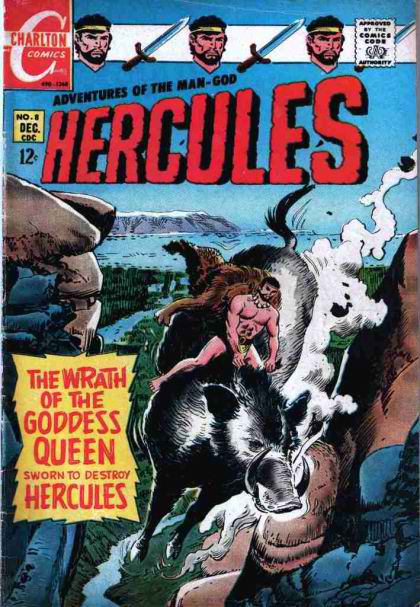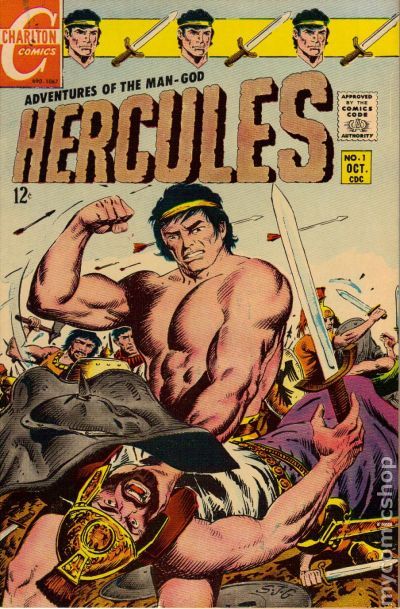Blogging Charlton Comics’ Adventures of the Man-God, Hercules – Part Two
 Joe Gill modified Denny O’Neil’s take on the Labors of Hercules when he succeeded him as scriptwriter on Charlton Comics’ Adventures of the Man-God, Hercules in 1968. Gill took the character of Eurystheus that O’Neil referred to as a judiciary member of the pantheon of gods on Mount Olympus and developed the character as a mortal king who is Hercules’ cousin on his mother’s side (Gill actually referred to him as Hercules’ uncle in his first appearance). By Issue #8, it was established that Hercules turns to King Eurystheus to receive each assignment in the remaining five labors he must complete before he is accepted among the gods of Olympus. Eurystheus is portrayed as a mortal puppet of Hercules’ vindictive stepmother Hera, the queen of the gods.
Joe Gill modified Denny O’Neil’s take on the Labors of Hercules when he succeeded him as scriptwriter on Charlton Comics’ Adventures of the Man-God, Hercules in 1968. Gill took the character of Eurystheus that O’Neil referred to as a judiciary member of the pantheon of gods on Mount Olympus and developed the character as a mortal king who is Hercules’ cousin on his mother’s side (Gill actually referred to him as Hercules’ uncle in his first appearance). By Issue #8, it was established that Hercules turns to King Eurystheus to receive each assignment in the remaining five labors he must complete before he is accepted among the gods of Olympus. Eurystheus is portrayed as a mortal puppet of Hercules’ vindictive stepmother Hera, the queen of the gods.
Issue #8, “The Boar” sees Eurystheus set Hercules the seemingly impossible task of capturing the Great Boar of Eurymanthus without injuring the beast. Upon scaling Mount Eurymanthus, Hercules is set upon by yet another pteranodon (a favorite of artist Sam Glanzman, apparently). Perhaps cognizant of the winged reptile’s repetition, Joe Gill provides the explanation that the pteranodons are conjured up from Earth’s prehistoric past by Hera. Zeus berates his wife for this unnecessary persecution of his son. Hercules is warned off his quest by the nearby villagers, but ignores their caution and scales to the top of the mountain and encounters the great boar itself. The man-god tames the beast with relative ease and rides it down the mountain (admittedly, a great visual) to present it to King Eurystheus. The storyline is very slight compared to the previous labors (clocking in at only 12 pages).
The rest of the issue is taken up with a supporting feature, “The Legend of Hercules,” which depicts the man-god’s childhood in the home of his mortal mother, Alcmena. The story opens on the domestic life of the infant Hercules and his mortal half-brother, Iphicles. The child Hercules first shows his incredible strength when he slays a pair of serpents that crawl into the toddlers’ crib one night. The script reveals that the serpents were sent by Hera in her jealousy. While closer to the mythological depiction of Hercules’ origin, the incident contradicts the code-approved storyline from previous issues that Alcmena and Zeus were married before Zeus and Hera wed. This was not, of course, Denny O’Neil’s original intent, but Dick Giordano enforced the Charlton Comics editorial policy which prevented dealing with out of wedlock pregnancy as much as it limited any sexual suggestion. This certainly made the faithful depiction of a series inspired by Greek mythology capitalizing on the booming sword & sorcery market challenging to say the least.
